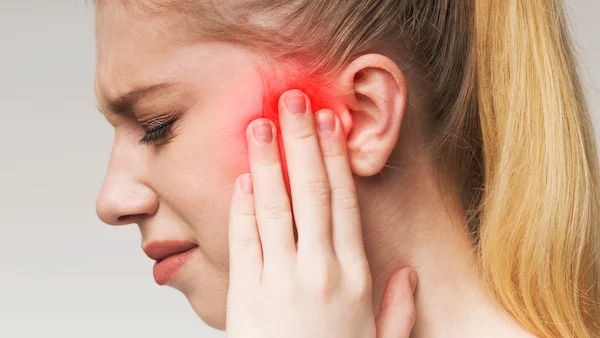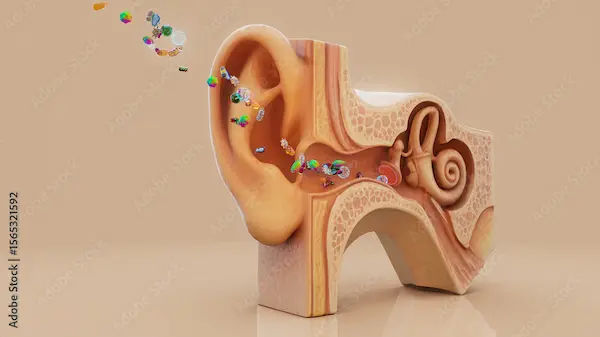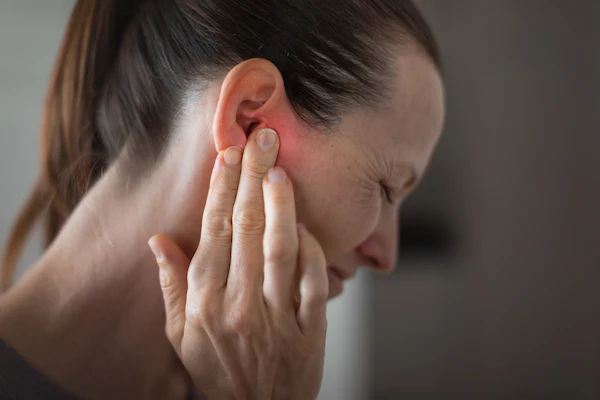Monsoon Ear Care: Your Ultimate Guide to Preventing Painful Ear Infections
Know about ear infections, why it is essential, 10 essential tips to keep ears safe, and habits to avoid ear infection

Written by Dr. Dhankecha Mayank Dineshbhai
Reviewed by Dr. Mohammed Kamran MBBS, FIDM
Last updated on 13th Jan, 2026

Introduction
The pitter-patter of rain, the earthy petrichor scent, and the cool relief from the summer heat make the monsoon a beloved season. However, this increase in humidity and moisture also creates a perfect breeding ground for bacteria and fungi, leading to a spike in health issues, particularly ear infections. When rainwater, often contaminated, finds its way into your ear canal, it can lead to painful conditions like Swimmer's Ear or middle ear infections. This comprehensive guide is your go-to resource for ear infection prevention during the monsoon. We will delve into the science behind why your ears are vulnerable, outline practical and effective prevention strategies, highlight symptoms you should never ignore, and advise on when it's time to consult a professional. Our goal is to equip you with the knowledge to enjoy the rainy season without the discomfort of a dreaded ear infection.
Why is Monsoon Season a Prime Time for Ear Infections?
The monsoon season fundamentally alters our environment in ways that directly impact ear health. The combination of high humidity and frequent exposure to water sets the stage for microbial growth.
The Humidity and Moisture Factor
Your ear canal is designed to be a self-cleaning, dry environment. The wax (cerumen) produced has antibacterial properties. However, during the monsoon, the ambient humidity levels soar. This constant moisture can soften the earwax, reducing its protective efficacy. A warm, damp ear canal becomes an ideal incubator for bacteria and fungi that are naturally present in the air and water, leading to infections. This is why the feeling of water-clogged ears is more than just an annoyance; it's a risk factor.
Consult a Top ENT for Personalised Advice
Increased Risk from Rainwater and Flooding
Rainwater, especially in urban areas, is rarely pure. It can contain pollutants, sewage, and various microorganisms. When this contaminated water enters the ear canal—whether from a sudden downpour, walking through puddles, or flooding it introduces a high concentration of pathogens directly into a vulnerable area. This significantly elevates the risk compared to exposure to clean water, making preventing ear infections in children during the monsoon who love to play in the rain a particular priority for parents.
Common Monsoon Ear Infections You Should Know
Understanding the type of infection can help in early identification and appropriate action.
Otitis Externa (Swimmer’s Ear)
This is an infection of the outer ear canal, the tube leading from the outside opening to the eardrum. It's clinically known as otitis externa and is extremely common during the monsoon. It occurs when water remains trapped in the ear canal, breaking down the skin's natural barriers and allowing bacteria to multiply. Symptoms often start with itching and redness inside the ear, progressing to pain that can be severe, especially when touching the earlobe.
Otitis Media (Middle Ear Infection)
This infection occurs behind the eardrum in the middle ear. While often associated with colds, it can be triggered during the monsoon due to Eustachian tube dysfunction. Allergies and sinus congestion, which are also common in the rainy season due to mould and pollen, can cause the Eustachian tube to swell and become blocked. This traps fluid in the middle ear, creating a breeding ground for bacteria, leading to otitis media. This type of infection is common in children and typically causes earache, a feeling of fullness, and sometimes fever.
Your First Line of Defense: 10 Essential Prevention Tips
Prevention is always better than a cure. Here are the most effective strategies for monsoon ear care.
1. Dry Your Ears Thoroughly: After any exposure to rain or showering, gently dry your outer ear with a soft towel. Tilt your head to each side to help water drain out.
2. Use a Blow-Dryer on Low Setting: Hold a hairdryer on the cool or lowest warm setting about a foot away from your ear for 30 seconds. This is a highly effective method for drying ears after getting wet without inserting anything into the canal.
3. Wear a Cap or Use Earplugs: When venturing out in heavy rain, a waterproof cap can help shield your ears. For those who are prone to infections, using swimmer's earplugs can be a great barrier.
4. Avoid Swimming in Dirty Water: Steer clear of pools that aren't well-maintained or natural water bodies like lakes and ponds during the monsoon, as they are more likely to be contaminated.
5. Don't Put Objects in Your Ears: This includes fingers, cotton swabs, or pens. These can scratch the delicate skin of the ear canal, creating an entry point for infection.
6. Use Preventive Eardrops (Consult a Doctor): For individuals very susceptible to Swimmer's Ear, a doctor may recommend using over-the-counter preventive eardrops after water exposure. These are typically a dilute solution of acetic acid (white vinegar) and alcohol. Always consult a doctor before starting any new treatment.
7. Manage Allergies: Since allergies can lead to middle ear problems, managing them with antihistamines or nasal sprays (as advised by a doctor) can be an indirect but crucial part of ear infection prevention.
8. Boost Your Immunity: A strong immune system helps your body fight off infections. Maintain a healthy diet rich in Vitamin C and Zinc, stay hydrated, and get adequate sleep.
9. Keep Your Ears Wax-Free (Professionally): While you shouldn't clean them yourself, excessive earwax can trap water. Consider getting your ears cleaned by a healthcare professional before the monsoon sets in.
10. Practice Good Hygiene: Wash your hands frequently and avoid sharing towels, pillowcases, or earphones to prevent the spread of germs.
Habits to Avoid for Healthy Ears in the Monsoon
Some common habits, though well-intentioned, can do more harm than good.
The Dangers of Using Cotton Swabs (Q-Tips)
The cardinal rule of ear care is to never put anything smaller than your elbow in your ear. Cotton swabs push earwax deeper into the canal, creating impactions. More dangerously, they can cause micro-abrasions in the skin, providing a perfect entry point for bacteria and leading to a fungal ear infection. The ear is self-cleaning; wax will naturally migrate out on its own.
Why You Shouldn't Ignore Allergy Symptoms
Many people treat nasal allergies as a minor inconvenience. However, unchecked allergic rhinitis can cause chronic inflammation and blockage of the Eustachian tube. This dysfunction is a primary cause of otitis media. If you suffer from monsoon allergies, effective management is a key part of your ear health strategy.
Recognising the Signs: Symptoms of an Ear Infection
Early recognition can lead to quicker relief. Be alert for these symptoms:
- Itching in the ear canal.
- Redness inside the ear.
- Discomfort or pain that may worsen when pulling on the earlobe.
- Clear, odourless fluid or pus-like discharge draining from the ear.
- A feeling of fullness or blockage.
- Muffled hearing or temporary hearing loss.
When to Seek Professional Help: Don't Ignore These Red Flags
While mild itching might resolve with careful drying, certain symptoms warrant immediate medical attention. If your symptoms are severe, include fever, or do not start to improve within 48-72 hours, it is crucial to see a doctor. If you experience intense pain, significant swelling, or hearing loss, these are signs that the infection may be worsening and requires prescription medication, such as an antibiotic or antifungal eardrops. If symptoms persist beyond two days, consult a doctor online with Apollo24|7 for further evaluation. For severe pain or discharge, a physical examination is often necessary, which you can book easily through platforms like Apollo24|7.
Conclusion
The monsoon season is a time for joy and renewal, and with a little precaution, you can ensure that ear infections don't dampen your spirits. By understanding the risks posed by humidity and contaminated water, and by adopting simple yet effective habits like thorough drying and avoiding harmful practices like using cotton swabs, you can significantly reduce your risk. Remember, your ears are delicate organs. Listening to your body and seeking timely medical help when needed is the most important step. Stay dry, stay aware, and embrace the beautiful rains with healthy ears.
Consult a Top ENT for Personalised Advice
Consult a Top ENT for Personalised Advice

Dr. Nishant Rana
Ent Specialist
8 Years • MBBS. MS ENT
Delhi
Apollo Hospitals Indraprastha, Delhi
Dr. Vaishnavi Bommakanti
Ent Specialist
9 Years • DNB
Secunderabad
Apollo Hospitals Secunderabad, Secunderabad

Dr. Riya Das
Ent Specialist
8 Years • MBBS, MS ENT(oto rhino laryngology)
Kolkata
MCR SUPER SPECIALITY POLY CLINIC & PATHOLOGY, Kolkata

Dr. Madhurima Mandal
Ent Specialist
6 Years • MBBS, MS (Otorhinolaryngology)
Bansdroni
Siddhita Healthcare., Bansdroni
Dr. Mahima H
Ent Specialist
5 Years • MBBS,MD - ENT
Bengaluru
Apollo Clinic, Sarjapur Road, Bengaluru
Consult a Top ENT for Personalised Advice

Dr. Nishant Rana
Ent Specialist
8 Years • MBBS. MS ENT
Delhi
Apollo Hospitals Indraprastha, Delhi
Dr. Vaishnavi Bommakanti
Ent Specialist
9 Years • DNB
Secunderabad
Apollo Hospitals Secunderabad, Secunderabad

Dr. Riya Das
Ent Specialist
8 Years • MBBS, MS ENT(oto rhino laryngology)
Kolkata
MCR SUPER SPECIALITY POLY CLINIC & PATHOLOGY, Kolkata

Dr. Madhurima Mandal
Ent Specialist
6 Years • MBBS, MS (Otorhinolaryngology)
Bansdroni
Siddhita Healthcare., Bansdroni
Dr. Mahima H
Ent Specialist
5 Years • MBBS,MD - ENT
Bengaluru
Apollo Clinic, Sarjapur Road, Bengaluru
More articles from Ear infections and earache
Frequently Asked Questions
What is the best way to get rainwater out of my ears?
Tilt your head to the side and gently pull your earlobe in different directions to help water drain out. You can then use a hairdryer on the coolest setting, held at least a foot away, to evaporate any remaining moisture.
Can I use hydrogen peroxide to clean my ears during the monsoon?
It's not recommended for regular prevention without a doctor's advice. Hydrogen peroxide can irritate the sensitive skin of the ear canal if used incorrectly, especially if an infection is already present. Consult a doctor for safe cleaning options.
Are there any home remedies for mild ear itching during the monsoon?
mild, diluted vinegar and rubbing alcohol solution (1:1 ratio) can help restore the ear's natural acidity and dry it out. However, do not use this if you suspect your eardrum is perforated. When in doubt, it's safest to consult a professional.
Why are children more prone to ear infections in the rainy season?
Children have shorter and more horizontal Eustachian tubes, which are easier for bacteria to travel through. They are also more likely to play in rainwater and puddles, increasing exposure.
How can I tell if my ear infection is bacterial or fungal?
It's very difficult to self-diagnose. Fungal infections (otomycosis) often cause more intense itching and a characteristic wet, black or white speckled discharge. However, only a doctor can make a definitive diagnosis through an examination, which is essential for correct treatment.




